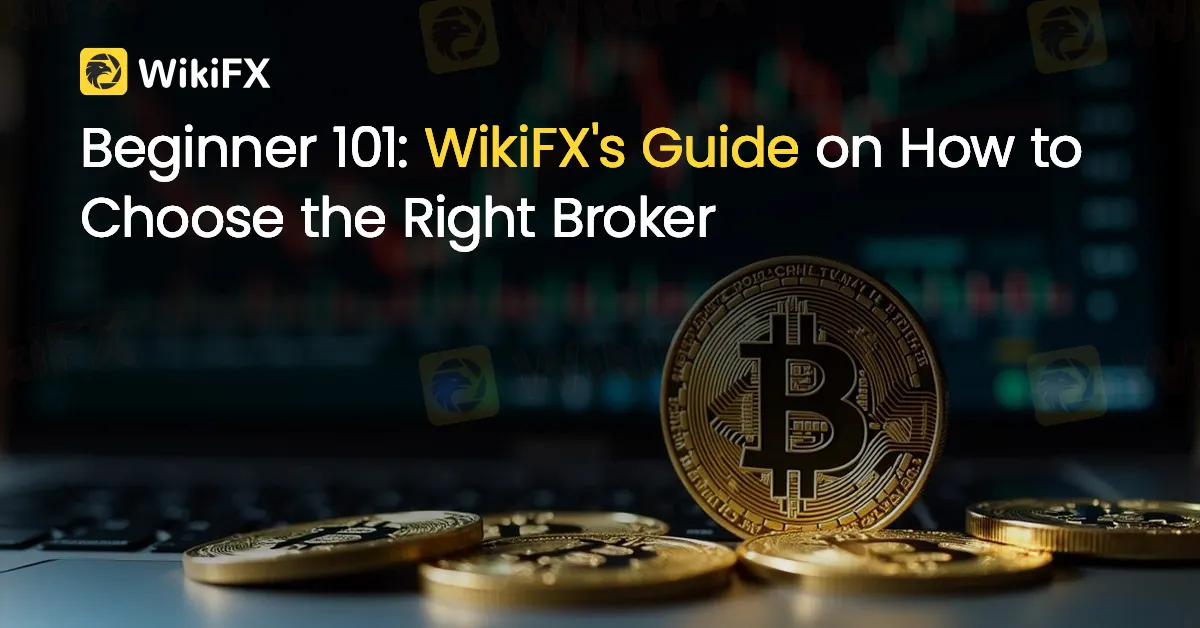简体中文
繁體中文
English
Pусский
日本語
ภาษาไทย
Tiếng Việt
Bahasa Indonesia
Español
हिन्दी
Filippiiniläinen
Français
Deutsch
Português
Türkçe
한국어
العربية
Beginner 101: WikiFX’s Guide on How to Choose the Right Broker
Abstract:For new traders entering the world of forex, choosing the right broker is one of the most crucial decisions they’ll make. A reliable broker can serve as a trusted partner, providing a platform that’s secure, transparent, and regulated. However, with thousands of options available, selecting the right broker can be overwhelming. That is why WikiFX is here to make things easy for you!

For new traders entering the world of forex, choosing the right broker is one of the most crucial decisions theyll make. A reliable broker can serve as a trusted partner, providing a platform that is secure, transparent, and regulated. However, with thousands of options available, selecting the right broker can be overwhelming. Many beginners overlook essential factors, such as the regulatory status of brokers, focusing instead on promises of high leverage or low spreads. Yet, regulatory compliance should be the top priority in this search, as it safeguards traders from potential risks associated with unregulated brokers.
Regulation is a fundamental aspect that sets trustworthy brokers apart from potentially fraudulent ones. Regulated brokers must adhere to strict standards set by financial authorities, including capital requirements, client fund segregation, and regular audits, all designed to protect traders. When a broker is regulated, it means they are accountable to a regulatory body and must operate transparently. Unregulated brokers, however, operate without these safeguards, which can expose traders to financial fraud or withdrawal issues. As such, when evaluating brokers, traders should always start by confirming whether the broker is regulated by a reputable financial authority.
One invaluable resource for researching brokers is WikiFX, a regulatory query platform specifically designed to help traders make informed decisions. WikiFX provides a free, comprehensive database of over 50,000 brokers worldwide, each verified with details about regulatory status, business legitimacy, and client feedback. Through WikiFX, traders can efficiently check a broker‘s regulatory information, helping them quickly identify licensed, reputable brokers and avoid those with questionable practices. The platform’s database also includes broker ratings, trading conditions, and user reviews, giving traders a complete overview to help in making an informed decision.

Another essential factor to consider is the broker‘s transparency regarding trading fees, spreads, and leverage options. A reliable broker will clearly disclose all trading costs and ensure that clients understand the charges involved. Beginners should be wary of brokers that promise extremely low or zero trading costs, as hidden fees may apply elsewhere. Similarly, understanding the broker’s leverage policy is vital, as high leverage can be risky for inexperienced traders.
Customer service and platform reliability also play a key role in choosing a broker. Traders should evaluate the broker‘s response time, availability of support, and accessibility to avoid any disruptions in service, especially during peak trading hours. Additionally, a good broker will provide a stable trading platform with robust security features to safeguard client funds and personal information. Testing the broker’s platform using a demo account is an excellent way to familiarize oneself with the tools available and assess the platforms ease of use and reliability.
Selecting the right broker is a critical step in every trader‘s journey and requires careful consideration. Beginners should use all available resources, including WikiFX’s extensive database, to verify regulatory compliance, assess fees and platform stability, and ensure the brokers legitimacy. By choosing a broker that aligns with these essential criteria, traders can approach the forex market with confidence, knowing their funds are in safe hands. Always remember that vigilance and informed decisions are key to protecting your investments in the world of online trading.

Disclaimer:
The views in this article only represent the author's personal views, and do not constitute investment advice on this platform. This platform does not guarantee the accuracy, completeness and timeliness of the information in the article, and will not be liable for any loss caused by the use of or reliance on the information in the article.
Read more

Top 10 Trading Indicators Every Forex Trader Should Know
Master the top 10 Forex trading indicators to analyze real-time Forex quotes, trends, and market signals. Learn strategies to boost accuracy and avoid mistakes.

Geopolitical Events: What They Are & Their Impact?
You've heard many times that geopolitical events have a significant impact on the Forex market. But do you know what geopolitical events are and how they affect the FX market? Let us learn about it today.

Why Do You Feel Scared During Trade Execution?
Trade execution is a pivotal moment for traders. It is when analysis turns into action, and potential profits or losses become reality. However, for many traders, this moment is accompanied by fear. Why does this happen, and how can you address it?

WikiEXPO Global Expert Interview: Simone Martin—— Exploring Financial Regulation Change
In the midst of financial innovation and regulation, WikiGlobal, the organizer of WikiEXPO, stays abreast of industry trends and conducts a series of insightful and distinctive interviews on pivotal topics. We are delighted to have the privilege of inviting Simone Martin for an in-depth conversation this time.
WikiFX Broker
Latest News
Volkswagen agrees deal to avoid Germany plant closures
Geopolitical Events: What They Are & Their Impact?
Top 10 Trading Indicators Every Forex Trader Should Know
TradingView Launches Liquidity Analysis Tool DEX Screener
MultiBank Group Wins Big at Traders Fair Hong Kong 2024
WikiEXPO Global Expert Interview: Simone Martin—— Exploring Financial Regulation Change
'Young investors make investment decisions impulsively to keep up with current trends' FCA Reveals
Why Do You Feel Scared During Trade Execution?
CySEC Settles Compliance Case with Fxview Operator Charlgate Ltd
Malaysian Influencer Detained in Taiwan Over Alleged Role in Fraud Scheme
Currency Calculator


